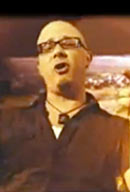Psalms for the Perplexed

Some mainstream Israeli musicians have recently been turning for material to religious texts; others have become immersed in the musical traditions of Sephardi Jewry. The two trends have come together in a new album, Mizmorei Nevukhim ("Psalms for the Perplexed"), by Kobi Oz.
Born Yaakov Uzan in the Negev development town of Sderot, Oz was formerly the lead singer of the popular band Teapacks, known for its biting satire and eastern-inflected pop. This new album, too, abounds with riffs on the terrors, longings, and sheer nuttiness of Israeli life, plus a whimsically phrased but dead-earnest questioning of dogmas both religious and secular.
What keeps the whole from nihilism is its rootedness in place, language, people, and a musical tradition on the verge of extinction. This is the distinctively cosmopolitan music of Middle Eastern Jewry, which comes out most forcefully in the tender and haunting song Elohai ("My God"). Here Oz's singing mixes with that of his late grandfather, a Tunisian cantor and hymnologist, forming a musical link to a once-capacious religious sensibility.
Oz is not alone in resuscitating artistic and spiritual traditions hitherto relegated to the sidelines or to the confining categories of "folk" or "ethnic." Nor is the trend limited to the culture of the Levant. The Hebrew University's Jewish Music Research Center aims at the rescue and dissemination of vanishing musical traditions of all kinds and all communities, while the Hebrew website Zemereshet focuses on the music of the pre-state Palestinian Jewish yishuv. Invitation to Piyut gathers multiple versions and performances of old and new liturgical poems.
Among performers mining classical Hebrew texts, just this past year Etti Ankri and Barry Sacharoff, two legendary artists, offered powerful renditions from the work of, respectively, Yehuda Halevi and Shlomo ibn Gabirol. (Of the two, Ankri's Mediterranean idiom tends to make for a more successful juxtaposition of old and new than do Sakharof's rock-inflected interpretations.) The younger artists of the Diwan Project rework traditional Yemenite liturgy in a melding of gentle lyricism with World Music sensibility.
From a different direction, the actor and songwriter Shuli Rand came out with a roar in his 2008 hit album, Nekudah Tovah ("Good Point"). Familiar to filmgoers from the movie Ushpizin, Rand was raised as a religious Zionist before moving into ultra-Orthodoxy. While embracing the reality of religious ups and downs, his music, infused with the existentialism of Bratzlav Hasidism, also exudes a near-dogmatic certainty in Orthodoxy as the soul's true compass. (The certainty wavers, for a second, in "The Poet," a heartbreaking song about Rand's contentious friendship with the late playwright Hanoch Levin.) A year earlier, the composer Yonatan Razel, another newly religious musician, released Sakh Hakol ("All in All"), its delicate arrangements perfectly suited to questing songs that explore the boundaries of faith and doubt.
The old, "Oriental" sensibility that many of these artists are striving to recover and articulate was nearly erased in Israel, first by the determination of secular Labor Zionists to "modernize" Mizrahi (eastern) Jews by divorcing them from their culture and later by the Shas party's no less determined reworking of Ashkanazi religious dogmatism in a Sephardi key. In reaction, the movement to resuscitate this sensibility has long suffered from more than a little romanticism, as well as from an inability to forge meaningful links with the religious tradition, historically an inseparable part of Middle Eastern Jewish identity.
In this sense, the willingness of Kobi Oz and others to engage not only with the religious tradition but with the possibility of faith itself, in Oz's case from a position of agnosticism, is an especially welcome development. In it one can't help seeing a hopeful grasping toward a distinctively Israeli form of "honest doubt," a condition in which, as Tennyson put it, "there lives more faith than in half the creeds."
Comments are closed for this article.




